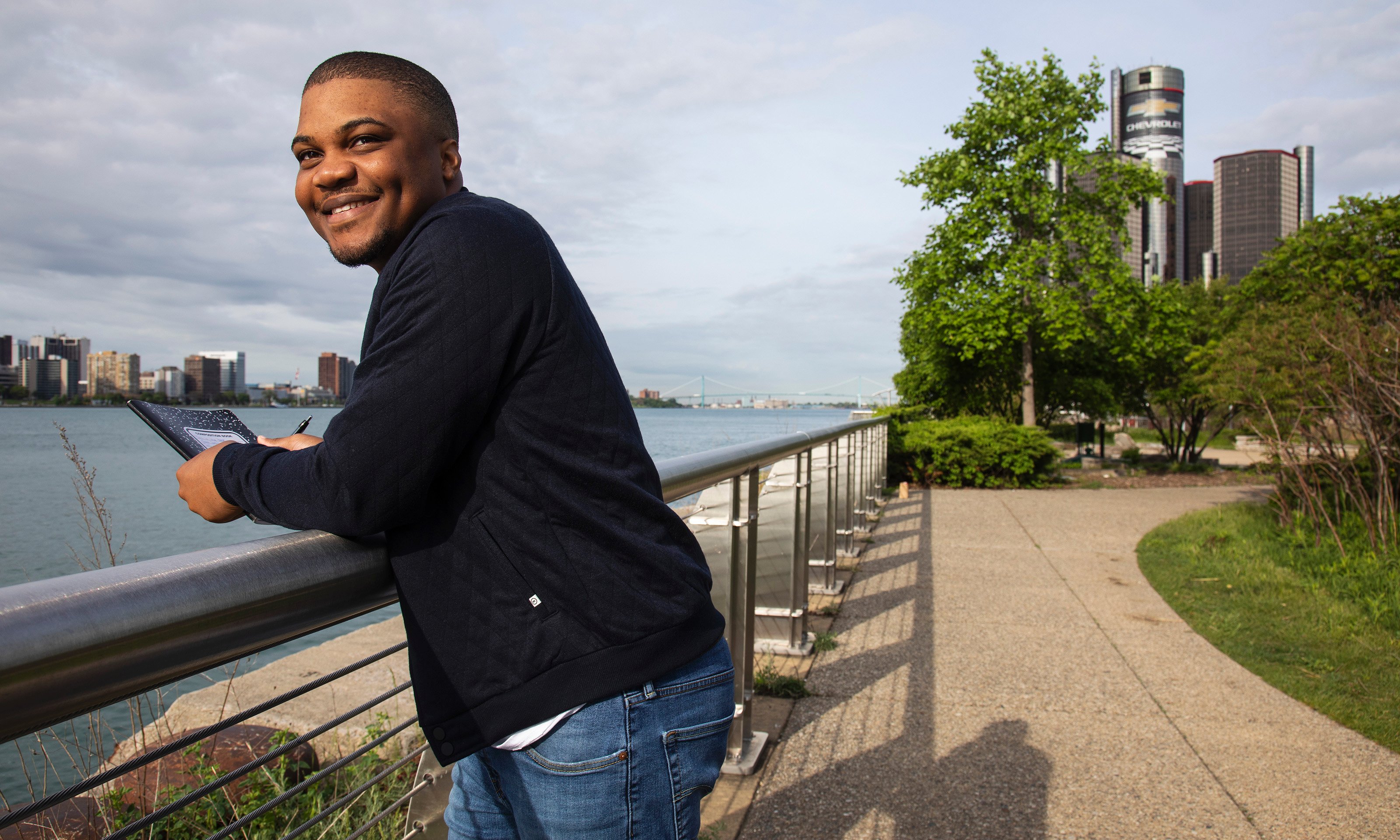Most kids remember staying up late at night, seeing their favorite television stations switch from the normal, happy-go-lucky, kid-oriented programming to something the older generation would enjoy. The shows that you are supposed to be asleep for, but you’re going off the script and being rebellious. You remember the rush you get, your heart beats a little faster, you cannot wait to tell your friends what you saw in class the next morning.
It’s not often that stumbling across those shows will have a long term, lasting impact on the course of your life.
“I was like 12 and somehow, I definitely shouldn’t have seen it, but I actually watched Def Jam poetry one night. It was way too long to be watching, but I just fell in love with it.”
From that day forward, Robert Laidler, CAS ’16, started writing poetry.
“I wrote classic rhyming, or more melodramatic, emotional teenage poems about girls,” laughs Laidler. “It wasn’t until I was about 16 or 17 that I started to get more serious about my craft.”
 |
FAMILY ROOTS
The first person to ever read Laidler’s work was his mother Lisa. Though not an avid writer or reader, she was always excited to see what Laidler would write next and shower him with compliments.
“When you first start out writing, you need someone to tell you that you have talent, you need someone to tell you how good you are,” explains Laidler. “She’d finish reading a poem and say, ‘Oh wow! This is great, you should keep going.’ That was all the encouragement I needed to continue writing.”
Since he was 13, Laidler has been the choir drummer at Trinity Christian Church in Taylor, Michigan, run by Pastor Rodney Wade. While Wade would eventually become Laidler’s stepfather, Laidler refers to him as his ‘step-up’ dad because of the impact that Wade had on his life and his willingness to go above and beyond the duties of a father.
Wade started his own athletic association called ICE — integrity, character and excellence. ICE launched in 2021 and, despite COVID-19, had more than 1,000 students enrolled.
“Robert is one of my main assistants on the weekends,” Wade says. “He’s volunteering and spending sometimes 13 to 14 hours a day with these kids, playing basketball with them on the weekends and coaching during the week.”
Wade is a humble man, who works hard to have an impact on his community. He prefers action over words, rolling up his sleeves and getting involved in his service programs to ensure that what he invisions happening, whether through the church or ICE, gets done. That way of thinking has translated from Wade to Laidler.
EDUCATION
College was not something on Laidler’s mind in high school, he wasn’t familiar with Oakland University, but decided to visit.
“Once I was on campus, I fell in love,” says Laidler. “It was small enough where I didn’t get lost and far enough away from home to get the real college experience. I found out more about the programs offered, specifically the ones for the not-so-great high school students. It just seemed like a good fit.”
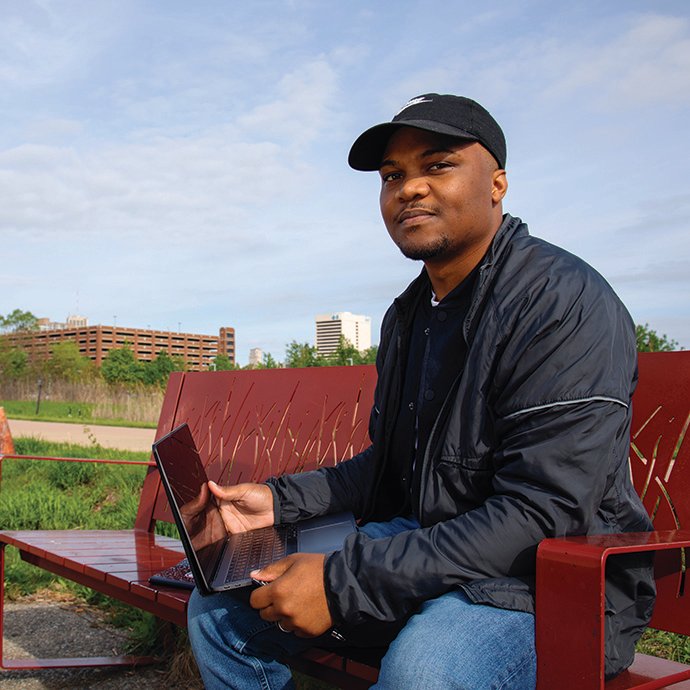 |
Laidler was accepted into OU’s admittance program as a conditional admit student, required to earn at least a 2.0 grade point average his first semester, a feat he accomplished by the skin of his teeth. During his college journey, Laidler bounced around focusing on a couple different majors before landing on creative writing. While on campus, he spent his time at the Rec Center playing basketball, attending poetry slams and Maurice Brown readings on campus, helping hone his skills.
Laidler became the first member of his family to graduate college in winter 2016, with a Bachelor of Arts in creative writing. After graduating from OU, Laidler earned a master’s degree from Wayne State as well as a Master of Fine Arts in creative writing from the University of Michigan.
WRITING STYLE
Laidler’s style has seen a stark change from the early, basic rhyme-scheme poems he wrote about girls in high school. The focus shifted from his internal thoughts and became more outward facing, focusing more on his audience.
“I’m much more focused on how what I write can affect somebody else,” says Laidler. “Sometimes in good ways and other times in confronting ways.”
His writing voice has a much different feel than his in-person personality, almost as if he has an alter-ego. “In person, I’m always silly, playing around any chance I can get,” says Laidler. “I play video games, golf and basketball. When I write, though, I get very serious. My humor can come out in my writing, but it’s almost like laughing-to-keep-from-crying humor.”
Laidler finds inspiration by going out in the world, being around people and listening. He works to get a pulse on what the general public is going through.
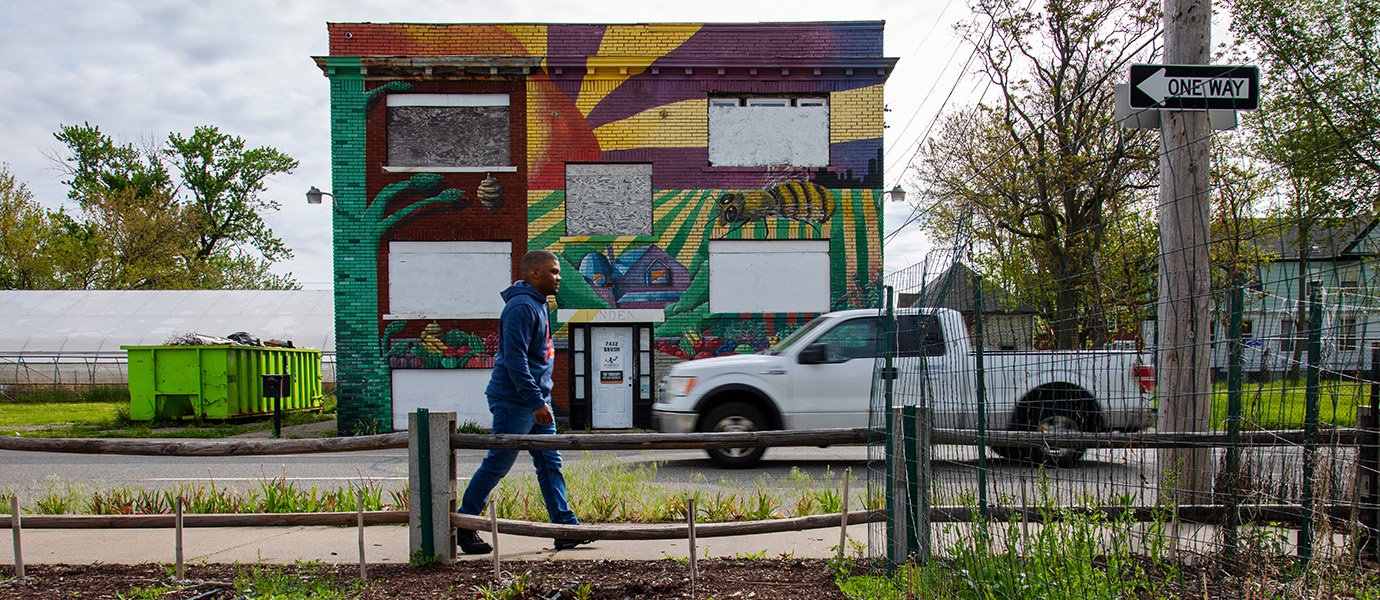 |
OPPORTUNITY KNOCKS
Through connections he made with OU’s English department and the English Channel, Laidler caught wind of a teaching job. “I was able to work in a correctional facility, with a group of inmates that wanted to learn about writing,” he says. “It was an amazing opportunity for me both professionally and personally.”
Once a week for three months, Laidler would travel up to the Thumb Correctional Facility in Lapeer. It quickly became evident that the room was full of students that were mentally hungry for an avenue to express themselves and tell their stories through different forms of writing: fiction, creative nonfiction, poetry, etc.
“It ended up being the most productive classroom I’ve ever been in,” says Laidler. “We just talked. I’d bring in poems from my favorite author or ones that I wrote myself and we’d go through them. It became an open, creative, safe space for both the inmates and myself.”
For 12 weeks, Laidler built relationships and was able to see growth within his students. To see the gratefulness that his students showed him and recognize the impact and importance his work had on them, it sparked his interest in teaching.
While at Wayne State, Laidler got involved with InsideOut in Detroit, working with public school students downtown, focusing once again on writing and rhetoric. “It’s no secret that Detroit Public Schools aren’t the best in the nation,” says Laidler. “But they’re still kids and they still want to learn.”
Laidler worked to create that same safe, open space he had in his previous teachings, allowing the students to feel open to take risks and be creative. He built trust with his students, giving them the opportunity to be vulnerable and expressive.
PROFESSIONAL ENDEAVORS
Through Wayne State, Laidler was exposed to City of Asylum, a group that brings writers in from different countries whose lives are at risk due to who they are and their work. Detroit just recently became an asylum city, currently housing a writer from Nigeria, Pwaangulongii Dauod. Dauod wrote an essay focusing on queer rights in Nigeria, that led to his life being threatened. City of Asylum works to house writers and expedite the process of applying for and receiving visas, so those at risk can work and live in safe locations.
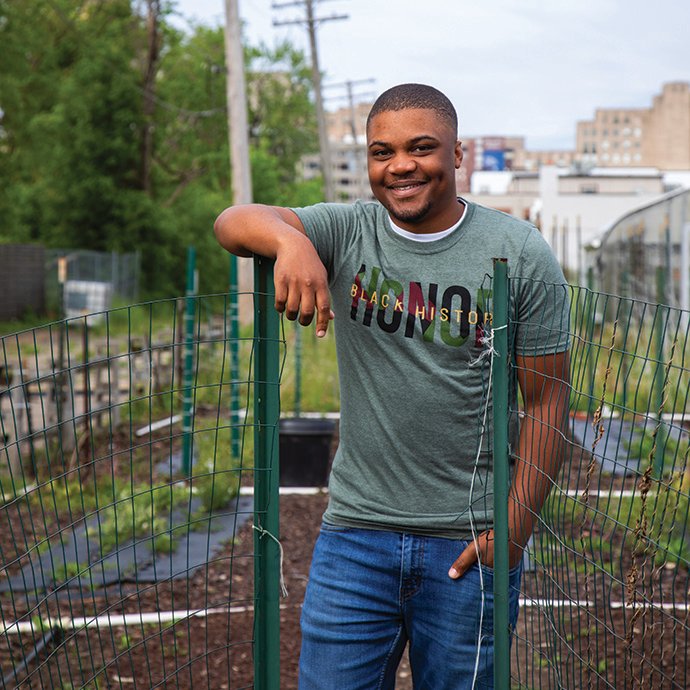 |
With City of Asylum, Laidler is a program coordinator, volunteering on several jobs and working to create his own project right now. Building off of his experience with inmates, Laidler is establishing a program that would work exclusively with ex-inmates and parolees.
“City of Asylum would help them gain their own experience working on some urban farms in Detroit to gain their own experience working in nonprofits,” explains Laidler. “With that experience they’d be able to develop their own nonprofits.” The ex-inmates and parolees would learn how to write grants and proposals, as well as see what goes on behind the scenes and how nonprofits run.
Outside of City of Asylum, Laidler is a part-time faculty composition teacher at Wayne State University. He is also in year one of the Helen Zell Writers Program fellowship at the University of Michigan.
UNDERDOG
Laidler is drawn to those within society that are underappreciated. He loves to highlight them in ways they haven’t been. “I am one of them,” says Laidler. “I always joke that if I was a fish, I’d be thrown back.”
“My whole life I’ve been underestimated and that’s fine with me, it gives me more opportunities to prove people wrong,” he continues. “People who are underrepresented have more to say than people who aren’t. Their stories are more important, more impactful.”
In April of 2022, Laidler performed his most impactful poem alongside the Imani Winds chamber music group at Seligman Performing Arts Center in Beverly Hills, Michigan.
“I was able to interview four juvenile lifers, who were eventually eligible for parole due to a law change in 2012,” Laidler explains. “Performing and writing their stories wasn’t the most rewarding part, it was afterward, when all four were in attendance and thanked me for honoring them.”
LASTING IMPACT
Laidler is so often spent focusing on other people, that his personal goals happen to go to the backburner, but not forgotten. “I want two poetry books and tenure. That’s all I want.”
His professional success isn’t his focus long term. Instead, he wants to leave behind a program that will continue to impact those without a voice. “That way, I can serve the community long after I’m gone,” he says. “It’ll be self-sustaining, operating like clockwork. Constantly getting new people involved and pouring back into Detroit.”
Laidler has put his faith into people, he believes they are the most important part of making change. “When you give people time to develop, you’d be surprised at what they can do. That’s the ultimate goal.”

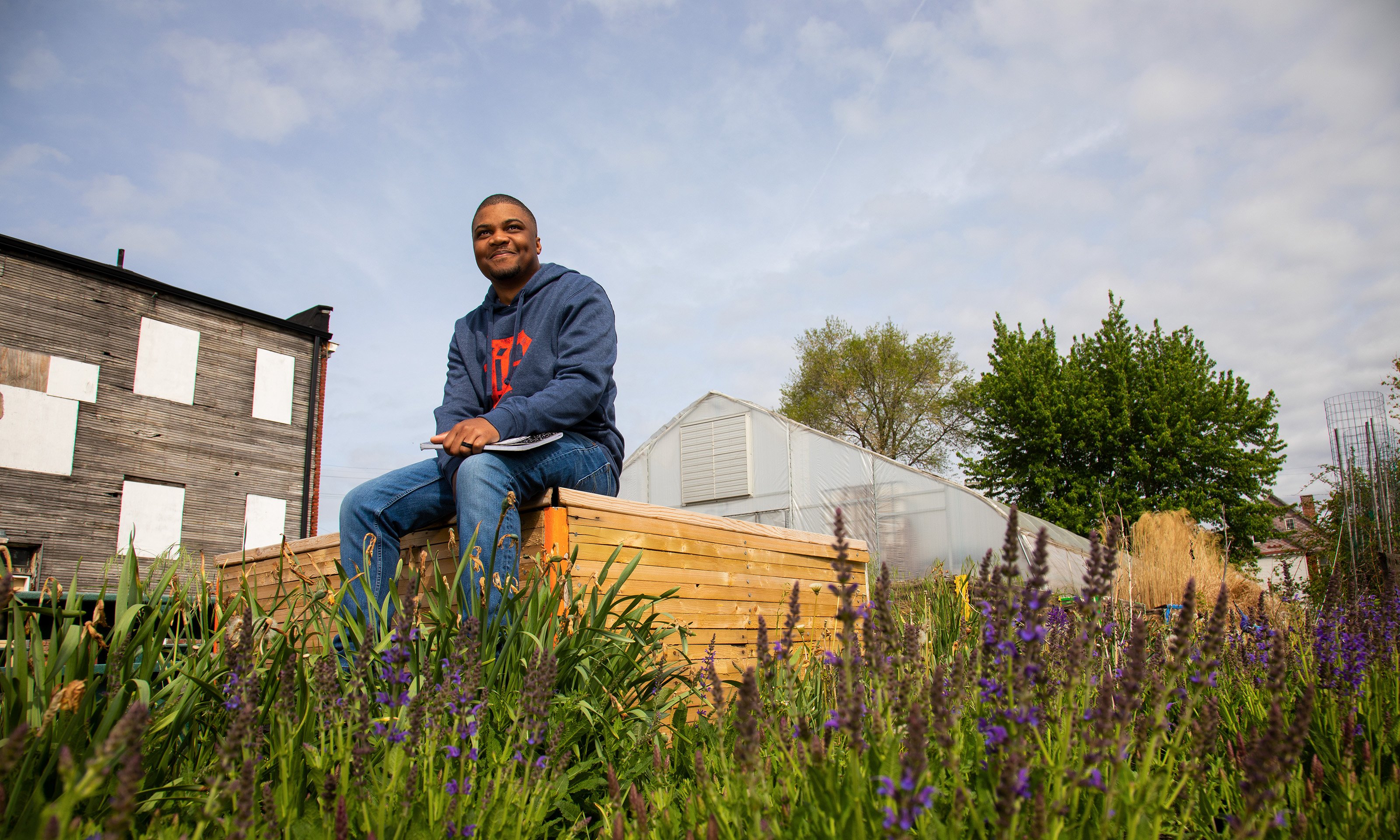
 September 1, 2022
September 1, 2022 By Michael Downes
By Michael Downes

